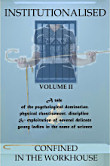The Library of Spanking Fiction: Wellred Weekly
|
||||||
|
Articles
Items of interest regarding all things spanking
|
||||||
|
|
Plausibility in Spanking Fiction (cont.)  In the past I've included all kinds of elements in stories in order to come up with a scenario of that type, which while perhaps not quite as realistic as some others, at least seems possible, although not without raising certain ethical and moral issues that I know may bother some readers. For example one of my latest stories revolving around the domestic arena involves the exploitation of the heroine's benzodiazepine (a prescription tranquilizer) dependence - engineered by a tame psychiatrist - in order to impose a regime of strict discipline backed up by spanking and the cane. And if you think the collusion of a health professional, psychiatrist, psychologist or nurse is far fetched... Well, that brings me to the wonderful world of institutional discipline and spanking. You'll notice I don't mention the term, 'scholastic', in the same breath as the word 'institutional' at any point - and there is good reason, I believe, for this. As was mentioned earlier, in any contemporary scholastic setting one might envisage existing in the Western world, any form of corporal punishment will have been outlawed by legislation, and all parties concerned will know this. Even if one were to delve into the fairly recent past - at a point when spanking and the cane were still accepted forms of correction - it is difficult to see past such done-to-death stereotypical scenarios as the spanking dealt out for smoking behind the bike shed or the caning earned for 'playing truant' and so on. Besides, it seems to me that for any spanking-related tale to be imaginative, suitably punitive and yet plausible (in that the disciplinarian should remain vouchsafed from busybody officialdom and do-gooder interference) some form of institutional residency becomes an essential part of the equation. But even the strictest residential educational institution one might realistically envisage would have woven into its routine various breaks and vacation periods - time and opportunity aplenty for any untoward or over-zealous disciplinary procedures to become public knowledge. Even if a writer should invoke some other form of institution in which various disciplinary measures might be expected to be in place to maintain order, whether judicial, such as a reformatory or prison, or even a psychiatric hospital or care home, the contemporary setting is difficult to work with - so many safeguards and guidelines in place you see, or so perhaps one might think. And yet, of the above examples, it is in the world of psychiatric institutions and of ecclesiastical charitable care homes that we find the most fertile ground for plausible and believable tales of strict discipline, petty rules and restrictions, over-the-knee spankings and liberal doses of the cane. After all, what could be more plausible than that which has actually taken place? For what has occurred in the past, history tells us, can happen again - and so often has! Right up into the 1970s we have had the so-called 'Magdalene laundries' - surely fertile ground in which to plant a tale of unrelenting exploitation, spanking and caning (as has indeed been done - for example, the film: The Magdalene Sisters, 2002 directed by Peter Mullan - but not yet to the point that the seam has become mined-out). We are long removed from the days of the Poor Law system, when a particularly fractious and refractory girl might be committed to the loving arms of the nuns of The Sisters of Mercy with the stated aim of making her 'more amenable to religious discipline' simply for having been seen flirting with one too many of the village lads - or perhaps having ill-advisedly refused the advances of some local dignitary. Nevertheless who is to say - assuming the reported longevity of the Magdalene laundries is not in question - what remnant of that system might still survive to this day behind high inscrutable stone walls somewhere? Then we have the world of the semi-legitimised experimental psychology investigation - witness the so-called 'Stanford Experiment' in which an approximation of a prison establishment was set up in a basement area of the prestigious Stanford University in the USA. The latter involved an all male protocol and was shut down after a few days having very quickly run out of control, those selected as prison guards exhibiting an ever greater tendency towards sadistic behaviour and the 'prisoners' becoming ever more resigned, even submissive. But what if it had not been shut down so promptly? What if the 'prisoners' were female (because I prefer that)? What if instead of student volunteers, members of less traceable sectors of society were to be recruited, the runaways, the type that those church-run 'laundries' and 'industrial schools' would once have branded as 'incorrigibles, at moral risk'?     The 1930s right through to the 1970s (with the 50s seemingly the heyday) seems the most fertile period for invoking the spectre of unethical psychology experiments - including, but not limited to, deliberately inducing stuttering in test subjects. But who is to say what is going on behind closed doors to this day - such scandals seem to have the knack of remaining buried until decades after the event. There is tremendous scope here. For example, take the above mentioned stuttering experiment: the protocol was based on utilizing psychological pressure to induce a verbal stumble or other speech defect and then capitalizing on it to create further pressure by drawing the subject's attention to the supposed speech defect. Would it be so difficult to imagine a residential cohort recruited from among late-teen runaways during perhaps the coldest winter in decades and legal waivers duly signed and dated. And what better way to apply psychological pressure than a wickedly pliant length of rattan hovering over an outstretched palm - and the warning given not to 'stammer over the reading of the passage this time through, girl'? Then we come to certain more contentious forms of 'treatment' reportedly prevalent in the contemporary world of psychiatric care. I am talking here of so-called 'harassment therapy'. Although it is true I have yet to come across a reliable, explicit report of corporal punishment being in use. The utilization of various forms of physical enforcement has been implied within contemporary accounts of young women being forced to clean out shower cubicles - and even toilets - on their hands and knees with toothbrushes and so on. Given such a regime, is it so far-fetched to imagine a pretty inmate draped over a nurse's knee for a hand or hairbrush spanking, her hospital examination gown peeled back either side of a delectable pair of bare drum-tight buttocks? Remember too, the ease with which it was once possible for a young wife to find herself committed on little more than the say-so of her spouse and a few pieces of silver having changed hands, perhaps to make way for an even younger, even more delectable morsel, perhaps to grant her spouse greater control over her estate... Oh the possibilities inherent in the granting of an enduring power of attorney! And then we come to the possibilities opening up through today's obsession with television 'reality' shows, many of which seem increasingly to be evolving towards the sadistic end of the spectrum in the trials and tribulations they put their contestants through. But then again, perhaps we shouldn't overlook reality itself, not when taking into consideration the ever-worsening economic situation in the West, the increasing gap between rich and poor and the dearth of employment opportunities. In such an economic climate with an excess workforce chasing fewer and fewer unskilled positions - coupled with a growing housing crisis - might we not be facing a situation wherein once again the price of labour becomes cheap enough for live-in domestic service to become a more common form of employment for a young school-leaver to find herself in. With the very roof over her head directly tied to her continued employment, wages amounting to little more than 'room and board' (the minimum legal wage is easily dealt with by offsetting against room rental coupled with inventively-levied financial penalties for poor performance) and no hope of further employment without glowing references, it would not be that difficult to imagine a few strokes of the cane or a few minutes spent over the lap of the mistress of the house being preferable to severance. Having dealt with the setting and the impetus for the imposition of a regime incorporating corporal punishment, we come to the ending of the tale. I do sometimes feel I should apologise for not providing any form of 'happy ending'. But happy endings are hard to come by in story telling where the action by definition would lead to the prosecution of the protagonists should the story leak out. That in itself, for some, would constitute a happy ending - the victim set free, her tormentors left behind bars. But is that what non-consensual story telling is all about? Given the high stakes, surely the perpetrators would go to great lengths to cover their tracks and ensure the secret of their actions remains safe. But for all time? How? I for one would not like to go down the fatal route taken by certain other writers of the genre. And for sake of plausibility, given a contemporary or near-contemporary Western world setting, the 'she was sold into slavery to an oil-rich sheikh and was never seen or heard from again' is out of the question. And yet many of those that disappeared into the depths of the Church-run 'industrial school' system were never seen or heard from again, outside of the convent walls - and one does not have to go too far back in history to invoke the existence of such an institution. Some say the last didn't perish until the early 1970s! Who's to say what might still survive of that system in some remote location. Then there are the welcoming arms of the mental health system - it was easier to be embraced within their tenacious protection in the 1960s (and easier still to arrange in even earlier times). Personally, I'd rather come across the hanging, open ending - a glimmer of hope for our hapless, browbeaten and put-upon heroine hanging somewhere out in the distance, but for now, the prospect of perhaps being placed into service under the stiletto heel of her domineering guardian, or cane-wielding, gold-digging young step-mother, made a servant in her own home. Or if ensconced in some institution, perhaps she is about to face some sort of review panel, visiting board of governors or government authority inspector with the prospect of putting her case and turning the tables, of bringing the full might of the law into her corner - but all the time, behind the scenes... Well, you get the idea!  13 comments:
erniethefiend said...
Hi Garth, good to see you here. I've been a fan of your blog for quite a while! 22 October 2012 03:07
PinkAngel said...
An informative article on an important subject. Very interesting. 22 October 2012 19:14
rollin said...
I see we are on the same page about this as I have two articles in this library on the very same subject. I regret not having heard of Mr. ToynTanen before, but I will now certainly check him out. I'll only add that the biggest challenge facing any writer of spanking fiction today is creating a plausible plot in contemporary times in which a non-consensual spanking takes place. It takes very special circumstances to bring this off in a way that is believable. 22 October 2012 19:59
jools said...
This was a very informative article. I agree that it is essential for a writer to create scenarios which enable readers to suspend their disbelief. Your article has given me inspiration for a story idea, outside my usual realm, which I hope to get around to writing one day. Thanks so much for a very interesting and thought-provoking read. 25 October 2012 08:10
tiptopper said...
An interesting article so I decided to check out his website, Behind The Barred Window. The site is pretty interesting but it is the slowest site I have ever encountered. It took 5 minutes just to get the entrance and another 5 minutes to get in. Navigation in the site is just as slow. The site itself is good but if you go there bring some reading material to while away the time while it creeps along at a snail's pace. Perhaps he should hire Februs to fix it. 25 October 2012 23:13
bendover said...
Many of the stories in the library are not really plausible, but they leave a great big smile on our faces none-the-less. We make comments at times that tell what might happen to those dealing out the punishments, but being fiction, it will never happen. Well, that is, unless we write it in. I've done this a few times. It was better than having to write a sequel upon sequel. I enjoyed the article quite a bit. It pulled many things in a lot closer. I just enjoy other people's comments and the way they look at things so differently and so alike. 26 October 2012 00:28
yenz said...
An author has the right to assume that his reader will accept certain statements. A ghost story is ineffective if the reader will not accept the existence of ghosts. In science fiction we must accept the strangest inventions in order to follow the authors use of these. Even an agnostic reader can have pleasure in reading a religious tale. A spanking story set in ordinary everyday life has to be plausible on one way or another if it iis not just becoming a story about cruelty and violence. The spankee may accept his or her fate because money, sex, curiousity or conscience. 26 October 2012 10:42
toyntanen said...
Many thanks for all the feedback so far everyone! Glad to have been inspirational, Jools. As much as anything, it was in the hope of inspiring others to write the sort of thing I was always hoping to read (especially when younger and new to the scene) that I started writing my own stuff in the first place - that, and for my own entertainment. That was certainly the case when I started the blog: In addition to showcasing the stuff I had written, the purpose was to give an idea of the type of thing I had found inspirational over the years (not always overtly related to spanking per se), to provide some suggestions of other... ahem!... interests that might, with a little imagination, be incorporated into spanking-oriented plot-lines and of course to inspire others, as I said before; the reason being that it is always more exciting to read something written by someone else than that which pops up in one's own head. And the latter is in spite of having lived, with my wife of the time, in a lifestyle arrangement involving a third party (way back in the 80s). Now, 'tiptopper' said, regarding my blog, Behind The Barred Window (why didn't I call it BEYOND The Barred Window? Don't know - wish I had!: "...the slowest site I have ever encountered. It took 5 minutes just to get the entrance and another 5 minutes to get in". Well, that certainly wasn't the case just a few days ago when I logged in to check the stats, tiptopper - but it sure as hell is true now! I went in an hour or so ago... and it was like wading through mud!!! The issue - on the first page at least - seemed to be waiting for the sidebar site-search 'widget' thingy to load... But this is an important feature as the blog goes back quite a long way in terms of posts. Many apologies for that! I'm not yet sure what has happened but in my own defense I have to say that I have since visited several other blogs hosted by Blogger and encountered similar difficulties - and once logged in I have then found it completely impossible to follow links to other blogs from their blog rolls or lists. This seems to be a Bloggersphere-wide phenomenon! Saying that: I now have reason to believe the problem might not be entirely global. While writing this I have been trying to access various other Blogger sites in the background, and while several spanking-orientated blogs have failed to load several others on various randomly-chosen innocuous subjects like 'drinking' and 'sewing' (one of my other-half's things) have loaded briskly (although one of the sewing blogs has now failed mid-download I just noticed). I have just backed-up my entire blog and templates etc and would urge those others of you who have blogs on Blogger to do the same - something sinister may be afoot I fear. In the meantime I am going to try temporarily taking out the search facility. One can always search a particular blog using Google and a few well-chosen keywords don't forget. For example, I host several scans of reader's letters pages taken from 1980s editions of Janus magazine - try Googling: Toyntanen blog Janus letters I have also been thinking for a while about carrying the blog over on to WordPress or Tumblr, now that the book I have been working on is coming to a close and I'm am more 'together' psychologically than I was for a while earlier in the year (and on and off since) when I went down with a bout of depression. The latter - Tumblr - I am particularly keen on, due to its mega, mega good archive facility wherein the entire contents can be spread out on the screen and browsed through in comfort... Great stuff! Having backed up my blog I might even have a go at migrating my stuff over to it today, if it doesn't seem too complex. If Blogger sorts out its problems then I might attempt to mirror the blog or run a slightly different type of thing in parallel. Best wishes, folks! Garth 26 October 2012 11:47
barretthunter said...
This is a very thought-provoking article. There's just one point I'd like to make. Some writers (I'm thinking primarily of non-spanking writers, but the same holds true for us) can transport you to a world that clearly is not realistic in the sense that it clearly doesn't exist and certain aspects of it contradict our understanding, but which is internally coherent and compelling. Such dreamworlds can be very powerful. They are undermined not by their inconsistency with the real world (though they're bound to take much from the real world) but by any internal inconsistencies. 26 October 2012 19:38
toyntanen said...
I'd agree that for many it is perfectly possible to enjoy a story set in a kind of fairy tale world / future world order or parallel universe / alternative reality. But then the brakes are off and we quickly find ourselves hurtling full tilt (and sometimes half-cocked) into a world filled with all sorts of possibilities and in which the only limitation is the depth of the writer's wicked imagination. It all seems a little too easy somehow. For myself; my preferences in terms of story setting lie in the present (although the technical advances of the present day seem hard enough to resist) or the not too distant past. Indeed I an loathe to venture too far into the past for fear of dulling the imagination through the ease in which it becomes possible to invoke all sorts of scenarios conducive to the imposition of harsh spartan regimes, strict discipline and corporal punishment in curbing the boisterous spirit of the more recalcitrant young lady. Plumb the shadowed underbelly of Victorian society and culture too deeply (or even more recent periods) and you are quickly confronted with all manner of anecdotes, reports and tales that fit quite easily come under the banner of 'you-couldn't-make-it-up'. As for the importance of self-consistency. I recently went to see the movie,' Loopers' at the cinema. Now,I am ready enough to suspend my incredulity when it comes to time travel plots - but then we came to the ending... Without giving too much away, the ending was preposterous. Why? Because the results of a particular character's actions (the younger version of the Bruce Willis chracter) were not consistent with the outcome observed due to other character's actions through the time lines... The plot was not internally self-consistent in that respect - and it totally ruined the whole film for me! 30 October 2012 14:38
Goodgulf said...
Plausibility is the key word when it comes to fantasy, sci fi, and spanking stories. You can't get realism (since you are dealing with unreal situations) but you can make your stories plausible. 25 November 2012 19:13
Minidancer said...
Is plausibility really so important? I dont think so. I read spanking fiction to escape reality. I dont really care if a cop would be fired and procecuted for spanking the 'lippy girl caught speeding'...in my book and my imagination, i want him to do it. Having said that, i do agree that spanking after superfluous spanking can grow boring without an interesting plot to drive the 'action' along. 27 February 2013 23:09
SinclairMP said...
Thank you for writing such a thorough and researched piece! Certainly food for thought. 26 January 2014 03:03
You need to sign in if you wish to make a comment   |
|||||
| Pages: 1 2 3 4 5 6 7 8 9 10 11 12 13 14 15 16 | ||||||


